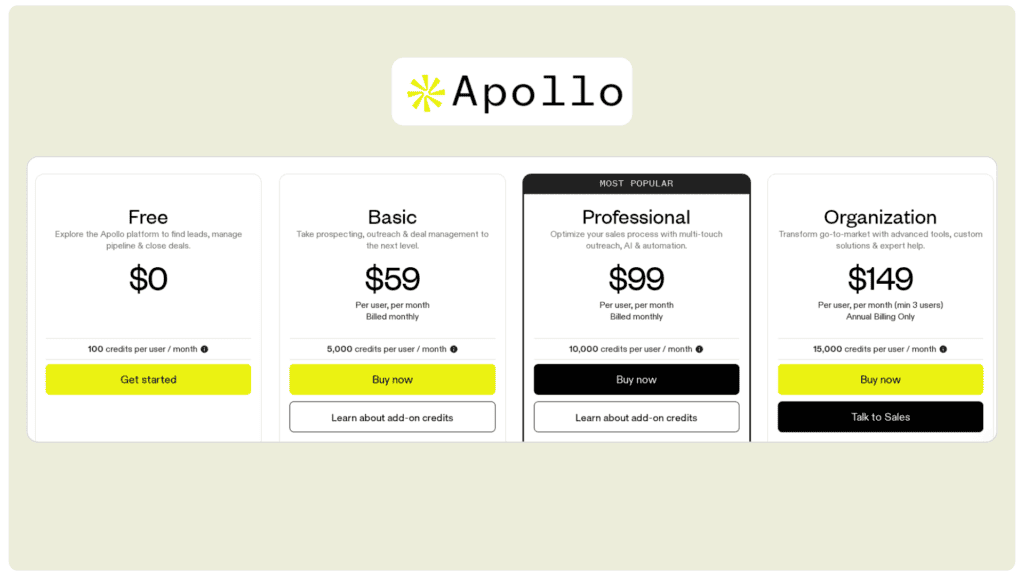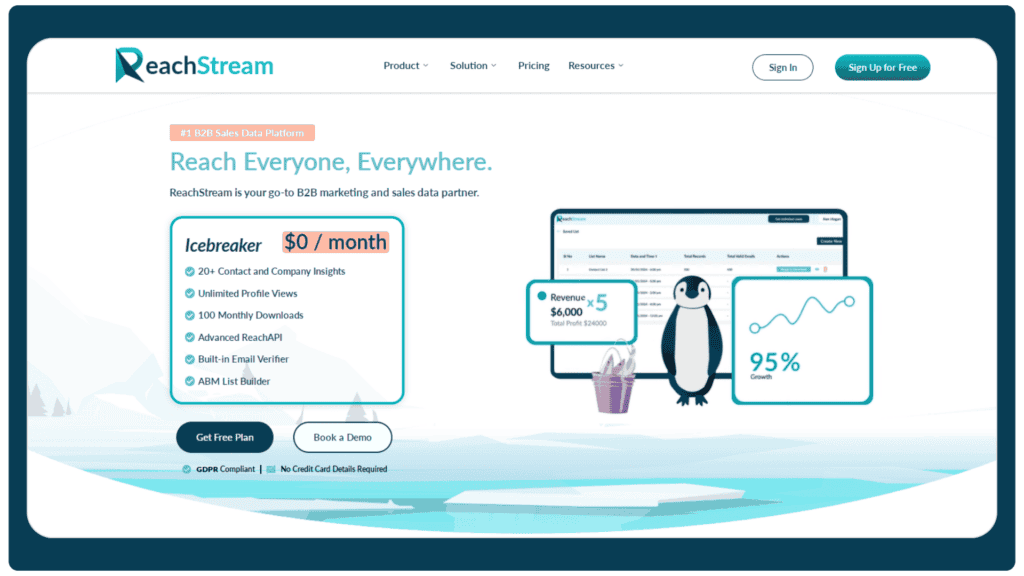Unlimited Data.
Infinite Possibilities.
Looking for B2B data? Download Unlimited data using our Chrome extension at just $79/month.
Apollo.io is a popular sales intelligence platform that offers various pricing plans, ranging from $0 to $149 per user per month. While it provides affordable options for businesses, many users have raised concerns about inconsistent pricing, fluctuating rates, and unclear sales pitches.
On the other hand, ReachStream has positioned itself as a trusted alternative, offering real-time verified data, transparent pricing, and a seamless user experience without the limitations on exports. Businesses looking for a more predictable and scalable solution often find ReachStream to be a better fit.
In this guide, we’ll take a closer look at Apollo.io’s pricing, features, and limitations to help you determine whether it’s the right choice for your business. We’ll also explore why ReachStream might be a stronger alternative for those in search of reliable B2B contact data. Let’s dive in!
Apollo.io offers multiple pricing tiers, ranging from a Freemium model to advanced paid plans. However, transparency remains a concern as detailed costs are not always readily available on their website. This lack of upfront clarity can make it challenging for businesses to budget effectively.
Apollo.io offers four pricing plans: Free, Basic ($49/user/month), Professional ($79/user/month), and Organization ($119/user/month, minimum of 3 users)—all billed annually. Each plan includes a structured allocation of email, mobile, and export credits, catering to different business needs with scalable features and integrations.

Despite advertising unlimited email credits, Apollo.io enforces a Fair Use Policy to prevent abuse:
Your email credit limit is whichever is lower:
Apollo.io offers a free plan along with three main paid plans: Basic, Professional, and Organization. Each plan varies in terms of data access, automation, and integrations.
Ideal for individuals who require limited contact credits and basic lead search functionality.
Apollo.io follows a tiered pricing model with a mix of free and paid plans. However, its credit-based system significantly impacts overall costs, requiring users to manage email, mobile, and export credits effectively.
Because of these factors, businesses often struggle to predict their true spending with Apollo.io. In contrast, ReachStream offers clear and upfront pricing without complex credit limitations, ensuring businesses have full control over their data usage and expenses.
While Apollo.io offers a structured pricing model, several drawbacks may impact budgeting, scalability, and user experience.
Apollo.io offers a large database, but some users have reported outdated or inaccurate contact information.
For businesses that need real-time, verified leads, alternatives like ReachStream may be a better fit due to their focus on higher data accuracy.
Apollo.io uses a credit-based system to manage contact access, affecting lead generation efforts.
Unlike Apollo.io’s credit-based model, ReachStream offers unrestricted access to B2B contacts with no hidden costs. This means:
No Credit Limits: Access as many verified contacts as needed without worrying about usage caps.
No Surprise Fees: No additional costs for unlocking more leads.
Predictable Pricing: Transparent, flat-rate pricing ensures consistent ROI.
For businesses looking to scale their sales outreach without restrictions, ReachStream provides a transparent, cost-effective solution. Rather than worrying about running out of credits, you can focus on closing deals and boosting revenue.
Apollo.io offers a range of features designed to support sales and marketing teams, but access to these features varies across different pricing plans. Many essential tools are locked behind higher-tier subscriptions, making it crucial for businesses to evaluate their true cost.
While Apollo.io’s Free Plan provides limited access, users looking for advanced sales automation and data enrichment must upgrade. Here’s a breakdown of some key features and their associated costs:

Unlike Apollo.io, ReachStream provides full access to its database without restricting users by credits. It also offers CRM integrations without extra fees, ensuring businesses get predictable pricing and higher ROI on their sales intelligence investment.
If your business requires scalable contact data, automation, and seamless CRM connectivity through ReachAPI, understanding these costs is crucial before committing to Apollo.io.
Apollo.io is designed for businesses that rely heavily on outbound sales and need a platform for prospecting, lead enrichment, and automation. However, it’s not necessarily the best fit for everyone.
✅ Startups & Small Businesses – Companies looking for an affordable sales engagement platform with basic automation tools.
✅ B2B Sales Teams – Companies that require a prospecting tool with CRM integrations and sales workflows.
✅ Companies with Large Sales Pipelines – Businesses that need bulk lead generation and automated outreach sequences.
❌ Businesses Prioritizing Data Accuracy – Apollo’s database may contain outdated or unverified contacts, leading to lower email deliverability rates.
❌ Companies Seeking Transparent Pricing – Apollo’s pricing structure involves hidden costs, additional credit purchases, and premium add-ons.
❌ Organizations Requiring Personalized Support – Customer service varies by plan, with priority support reserved for higher-tier users.
While Apollo.io works well for sales teams that focus on high-volume outreach, businesses that need real-time verified data, transparent pricing, and superior customer support may find ReachStream a more reliable alternative.
Yes, Apollo.io offers a free plan, but it comes with significant limitations. Unlike a traditional free trial that provides full access for a limited period, Apollo’s free plan restricts the number of credits and features available to users.
Apollo.io’s free plan offers limited access to its features, making it suitable for individuals or small teams exploring the platform. However, restrictions apply, especially regarding email credits and automation.
While Apollo’s free plan allows users to explore the platform, the email credit limitations and restricted features may require an upgrade for more advanced prospecting and outreach.
If you’re considering canceling your Apollo.io subscription, it’s important to understand their cancellation policies, which vary depending on your plan type.
Apollo.io does not issue refunds after payment. Canceling mid-cycle won’t get you a refund for unused time.
Many users report that canceling an Apollo.io subscription is not as straightforward as expected. Instead of a simple cancellation button, users are required to interact with Apollo’s chatbot to request termination. This can be frustrating, especially for users seeking confirmation for accounting or compliance purposes.

Apollo.io is often favored by small to mid-sized businesses (SMBs) looking for a budget-friendly sales intelligence tool, primarily for prospecting within the U.S. However, its credit-based system, hidden costs, and limited global reach can make it a less-than-ideal choice for businesses requiring unlimited access, seamless integrations, and extensive Do-Not-Call (DNC) compliance.
If your business depends on global prospecting without credit limitations, ReachStream is a superior alternative.
When choosing a B2B contact database, reliability, coverage, and cost transparency matter. ReachStream outperforms Apollo.io by offering unlimited access, real-time verified data, and seamless integrations, without hidden restrictions. Here’s why ReachStream is the smarter choice for your business:
Unlike Apollo.io’s credit-based model, ReachStream offers transparent and predictable pricing with unlimited access to verified contact data.
While Apollo.io primarily focuses on the U.S market, ReachStream provides a broader database covering North America, Europe, APAC, and beyond — spanning 150+ countries and 400+ industries.
Apollo.io users frequently report outdated or inaccurate data. ReachStream ensures high-quality, real-time verified B2B contact information, reducing bounce rates and increasing conversions.
ReachStream prioritizes data privacy and regulatory compliance, offering pre-scrubbed DNC lists and ensuring marketing outreach aligns with legal standards—something that Apollo.io struggles with.
While Apollo.io’s integrations are tier-restricted, ReachStream offers easy and flexible integration with leading CRMs and sales automation platforms across all pricing plans.
According to user feedback, Apollo.io’s affordability and database size make it attractive, but its inconsistent pricing, data quality concerns, and limited international reach are major drawbacks.
On the other hand, ReachStream earns high praise for its:
While Apollo.io is a decent choice but businesses looking for global reach, high data accuracy, and regulatory compliance find greater value with ReachStream.
When comparing Apollo.io and ReachStream, the choice ultimately depends on your priorities and company needs. If you are looking for an affordable sales intelligence platform with basic prospecting tools and are comfortable with credit-based limitations, Apollo.io might be a viable option. However, for businesses that require real-time verified data, transparent pricing, and access unlimited credits without restrictions, ReachStream stands out as the superior choice.
ReachStream provides greater flexibility with its predictable pricing, ensuring businesses can scale their outreach without worrying about additional credit purchases or hidden fees. With a commitment to data accuracy, compliance, and seamless integrations, ReachStream empowers sales and marketing teams with reliable B2B contact data to drive conversions efficiently.
Apollo.io offers a free plan with limited features, including 100 email credits per month for users without a verified corporate domain, but access to advanced capabilities requires a paid subscription. In contrast, ReachStream provides a more flexible free plan with access to verified B2B contacts, allowing users to explore its features without restrictive limits or the need for a credit card.
While Apollo.io claims to provide unlimited email credits, they are subject to a Fair Use Policy. Paying customers can receive up to 1 million credits annually, but additional charges may apply beyond specific thresholds.
ReachStream, along with its ReachAPI, offers unlimited access to B2B contact data with transparent pricing, real-time verified leads, and seamless CRM integrations — all without hidden costs or restrictive credit limits.
Apollo.io requires annual plan users to request a cancellation at least 30 days before renewal. Monthly plan users must cancel before their next billing cycle. Refunds are not provided once payment is made.
ReachStream supports broad international coverage, making it ideal for businesses expanding beyond the U.S. market. In contrast, Apollo.io is primarily U.S.-centric, limiting its global applicability.
Access 120M+ verified business emails and grow your sales pipeline effortlessly.